
- Homepage
- Conflict
- Material
- Photo Type
- Album (13)
- Albumen (14)
- Ambrotype (201)
- Cabinet Photo (67)
- Cdv (482)
- Cdv & Tintype (6)
- Cdvs & Tintypes (7)
- Daguerreotype (84)
- Gelatin Silver (13)
- Mixed (3)
- Negative (10)
- Negative Photo (4)
- Opalotype (4)
- Other (4)
- Photograph (4)
- Snapshot (3)
- Stereoview (23)
- Tintype (536)
- Tintypes (3)
- Unknown (12)
- ... (5597)
- Subject
- Children & Infants (21)
- Civil War (31)
- Civil War Soldier (12)
- Ethnic (17)
- Family (25)
- Fashion & Costumes (10)
- Figures & Portraits (149)
- Genealogy (10)
- Historic & Vintage (90)
- History (24)
- Men (59)
- Men, Civil War (58)
- Men, Military (39)
- Military (98)
- Military & Political (586)
- Military & War (14)
- Portrait (15)
- Portraits (14)
- Soldier (12)
- Women (19)
- ... (5787)
- Theme
- Americana (42)
- Americana, Fashion (18)
- Americana, Militaria (18)
- Antique (8)
- Art (7)
- Civil War (14)
- Conflicts & Wars (7)
- Fashion (19)
- History (44)
- History, Militaria (10)
- Love (6)
- Militaria (1058)
- Patriotic (7)
- People (21)
- Politics (15)
- Portrait (69)
- Portrait, Man (22)
- Stamps (27)
- Travel (6)
- Victorian (7)
- ... (5665)
- Type
- Belt Buckle (3)
- Carte De Visite (2)
- Cdv (3)
- Cdv Photograph (15)
- Daguerreotype (3)
- Full Cdv Photo Album (2)
- Illustrated Book (3)
- Negative Film Photo (4)
- Pendant (3)
- Photo Album (3)
- Photo Frame (2)
- Photograph (1382)
- Photograph Album (53)
- Picture Book (8)
- Picture Frames (8)
- Print (3)
- Real Photo (rppc) (10)
- Tintype (9)
- Tintype Photo (4)
- ... (5570)
C. 1860's Charles Sumner / Unknown Jurist Cabinet Photograph CIVIL WAR
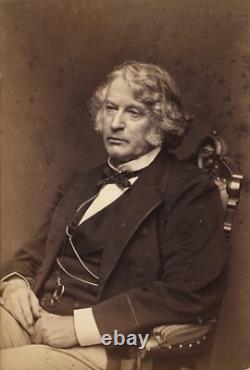
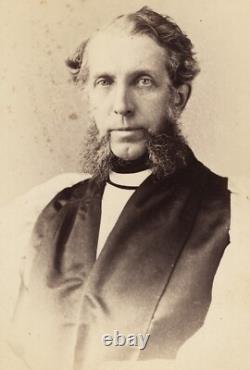
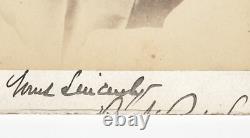
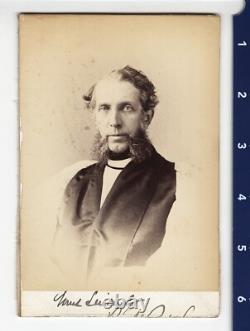
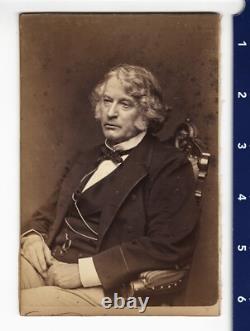


SUBJECT : Charles Sumner (see bio below) & Unknown Jurist. SIZE : Board measures 3.875" x 6", and mounted photos measure 4" x 5.875" & 4" x 5.375". Charles Sumner was born on January 6, 1811, in Boston, Massachusetts. Raised in a family that valued education and civic duty, he graduated from Harvard College in 1830 and then Harvard Law School in 1834. Early in his career, he became known as a scholar and reformer, aligning himself with causes such as prison reform and the promotion of universal education. He traveled to Europe in the late 1830s, where he studied legal systems and developed a profound commitment to human rights, especially the abolition of slavery. By the 1840s, Sumner was gaining recognition as a public intellectual and orator.
He emerged as one of the leading voices against slavery in Massachusetts and became a prominent figure in the Free Soil movement, which opposed the expansion of slavery into western territories. In 1851, he was elected to the United States Senate as a Free Soiler, and he would remain a senator from Massachusetts until his death, switching affiliations to the Republican Party as it formed in the 1850s. Sumner's Senate career was marked by unwavering moral conviction and sharp rhetoric. He became known for his powerful anti-slavery speeches, most famously "The Crime Against Kansas, " delivered in 1856.
In this address, he denounced the pro-slavery forces responsible for violence in the Kansas Territory and personally insulted Senator Andrew Butler of South Carolina. Two days later, Butler's cousin, Representative Preston Brooks, entered the Senate chamber and brutally beat Sumner with a cane, nearly killing him. The attack symbolized the deepening sectional crisis and turned Sumner into a martyr for the abolitionist cause. He was a fierce advocate for the complete abolition of slavery and the full civil and political rights of African Americans. He played a central role in shaping Reconstruction policy, insisting that the former Confederate states should not be readmitted to the Union until they guaranteed equal rights for all citizens. He opposed President Andrew Johnson's lenient Reconstruction policies and supported Johnson's impeachment.Sumner was also a champion of the Civil Rights Act of 1875, which sought to guarantee equal access to public accommodations regardless of race, though the law was not effectively enforced and was later declared unconstitutional. Throughout his career, Sumner was known for his idealism, inflexibility, and devotion to principle. He sometimes clashed with his own party and allies, particularly when he felt that justice was being compromised. In his later years, he worked to reconcile the North and South, but only on the basis of racial equality and constitutional rights for all.
Charles Sumner died on March 11, 1874, in Washington, D. He had been active in public life for more than three decades and left behind a legacy as one of the most courageous and influential voices in the fight against slavery and racial injustice in American history.

